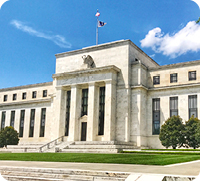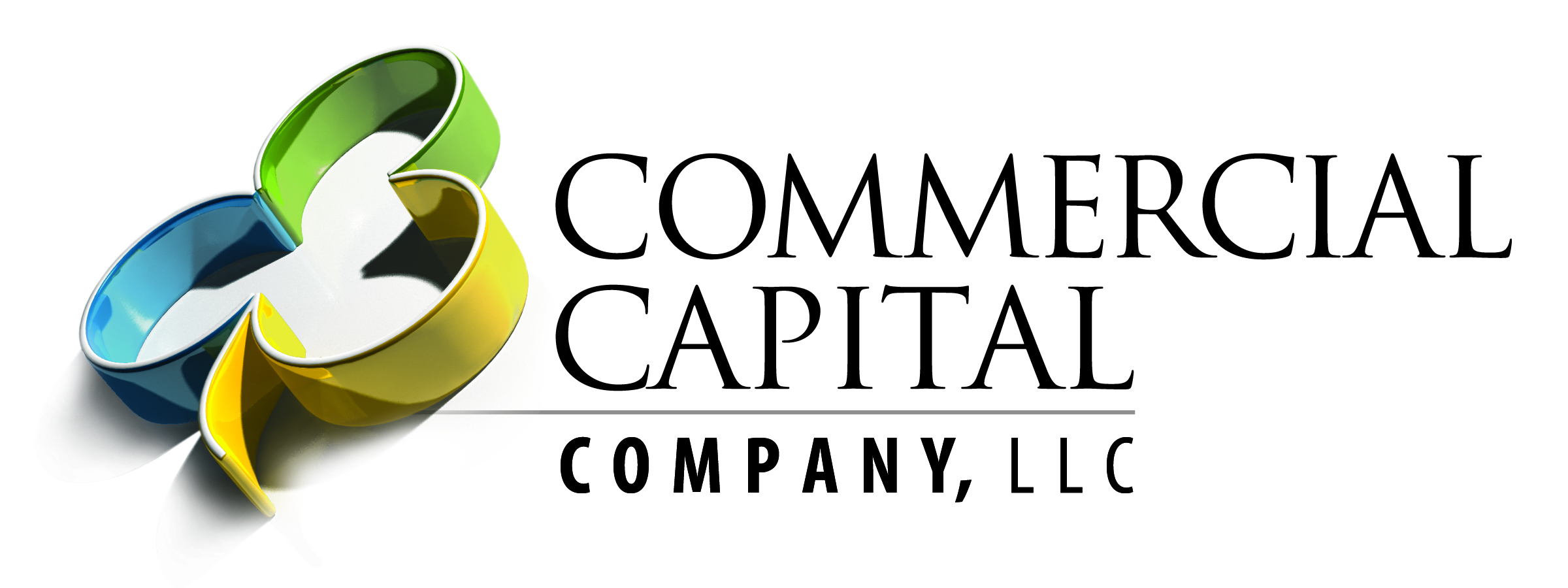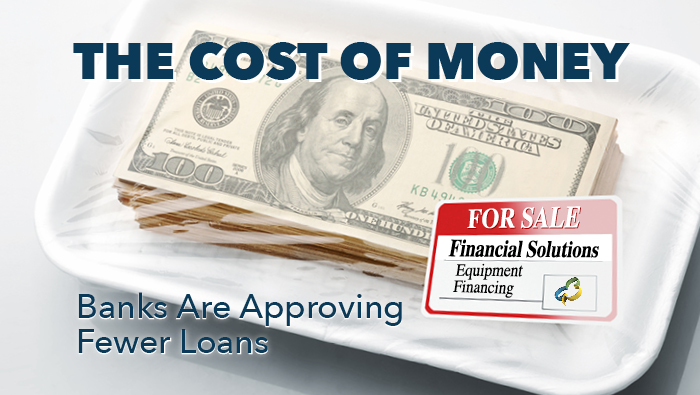46% Of Banks Raised The Cost Of Financing
Banks Approving Fewer Loans
Equipment loans for small business are increasingly more expensive and difficult to find with no relief expected in the near future. Small businesses are a dynamic growth generator of many industries and communities, but recent data shows they face significant financial challenges. According to the Federal Reserve Banks’ Small Business Credit Survey, an unnerving 59% of small businesses reported being in fair or poor financial condition.
Currently, only 42% of small businesses have met their needs for capital, exposing a significant disparity in financial services for these businesses. Most rely on large or small banks as their financial services provider. This over reliance on banks could be due to a lack of knowledge of other financing options, such as alternative lenders or angel investors.
For small business owners seeking growth through equipment acquisition, approvals for equipment loans are getting harder to come by.
 The Federal Reserve’s Senior Loan Officer Opinion Survey, or SLOOS, gives insight to how loan officers are operating following the recent collapse of Silicon Valley Bank and Signature Bank. Senior loan officers at up to 104 banks across the country responded to the survey.
The Federal Reserve’s Senior Loan Officer Opinion Survey, or SLOOS, gives insight to how loan officers are operating following the recent collapse of Silicon Valley Bank and Signature Bank. Senior loan officers at up to 104 banks across the country responded to the survey.
As of the first quarter, approximately 46% of banks surveyed raised the cost of financing for commercial and industrial loans to mid-sized businesses. Nearly 63% reported that they raised premiums for lending. Expanding regulatory oversight, dropping equity valuations and compressed net interest margins may cause banks to limit further lending. Tighter loan terms and more collateral requirements for small and medium sized businesses increase the risk of a hard landing for the economy.
“The more they increase the interest rate, it’s going to make getting credit much, much tougher,” says Kent Belasco, director of Marquette University’s commercial banking program. “Businesses aren’t going to take out loans. Consumers are going to start to pull in.”
Economists expect lending practices to continue tightening in the near future as the survey is a leading indicator of how bank behavior is likely to evolve over time.
“Just like Fed hikes, there is a long and variable lag from the impact of tighter lending standards on the economy,” Michael Kantrowitz, chief investment strategist with Piper Sandler & Co. “This confirmation of tighter lending standards pushes recession odds even higher.”
Same Song, Slower Tempo
For months now, our past blog posts are filled with reports of the Federal Reserve raising interest rates and recent bank failures which accentuate the current precarious economic climate.
Since March 2022, the Feds have increased the target interest rate from nearly 0% to over 5% in an attempt to combat inflation and diminish the robust job market. The Fed funds current target rate is 5.25% and is expect to rise further as we move into the 2nd half.
Rising interest rates, high inflation and other economic uncertainties are expected to weigh on investment and slow down the economy.
Perception vs. Reality
 The sudden collapse of Silicon Valley Bank and Signature Bank disrupted the entire banking industry and exposed weakness in the financial foundations of some regional and smaller local banks. In contrast, our country’s biggest banks are raking in billions and are likely to continue doing so even as the economy looms toward recession. In contrast, regional lenders are perceived as more at risk.
The sudden collapse of Silicon Valley Bank and Signature Bank disrupted the entire banking industry and exposed weakness in the financial foundations of some regional and smaller local banks. In contrast, our country’s biggest banks are raking in billions and are likely to continue doing so even as the economy looms toward recession. In contrast, regional lenders are perceived as more at risk.
Even though the runs on deposits that brought down Silicon Valley Bank and Signature Bank did not spread as widely as some feared, the perception of failure remains a major concern for depositors across the nation. Economists observe strains in the way banks manage assets and liabilities are becoming “increasingly evident” creating downward pressure on profitability. These regional bank failures have no doubt spooked depositors creating a lack of faith. A deterioration in the operating environment and funding conditions is aiding a wider perception of instability in medium to small sized banks.
“Overall I continue to believe that the industry is in strong shape and good condition,” said Al Landon, assistant dean at the University of Utah’s David Eccles School of Business. “But, it’s pretty understandable that when you have multiple, simultaneous shocks that some people would rightfully wonder if there are systemic problems.”
Landon asserts the quick regulatory actions gave “a fair amount of confidence that we’re not at a calamity stage” but admits the events have raised awareness and scrutiny surrounding the unusual circumstances that induced the bank failures.
Rising interest is a blessing and a curse. In response to months of Fed rate hikes, banks have increased the rates they charge for loans much more aggressively than what they pay out on deposits. That helps boost quarterly earnings at some of the nation’s largest banks. But, loans are financed by deposits which are becoming more expensive. Deposits are falling for regional banks and the cost of keeping customers is rising which is reducing profits. Investors are looking to money market funds and other higher yielding options, forcing banks to pay more to hold on to their deposits.
The largest banks remain robust in contrast to smaller banks which continue to struggle. This trend is expanding across the industry reducing profit margins and making regional banks more reluctant to lend to small businesses.
Small Business Continues To Explore Growth Options
 Currently, over three-quarters of small business owners are concerned about raising capital. A Goldman Sachs survey issued in April 2022 showed that 77% of business owners were confident about raising capital. Fast forward one year and that number’s flipped. In April 2023, 77% of owners said they were worried about gaining access to credit.
Currently, over three-quarters of small business owners are concerned about raising capital. A Goldman Sachs survey issued in April 2022 showed that 77% of business owners were confident about raising capital. Fast forward one year and that number’s flipped. In April 2023, 77% of owners said they were worried about gaining access to credit.
Nearly 1 in 5 of the small business owners surveyed by Goldman Sachs had applied for a loan in the past three months. Of those, over 60% stated it was hard to access available capital.
Access to affordable credit is essential for growth when funding initial start-ups or expansion of establish companies. Many small business owners are not able to use personal savings to expand their company’s growth leaving them with few options.
A recent survey done by Codat, a small business data collection and automation firm, revealed that 65% of small business leaders were planning to acquire credit in 2023 with 75% of them doing so as a survival strategy in regards to cash flow and employee retention. Nearly 90% seeking credit have grave concerns that inability to access capital threatens the survival of their business.
Seeking Relationships That Work
Economists observe supply-chain backlogs have returned to their historical averages and will ease equipment delivery delays and shortages this year. Less demand and an improving public health situation have combined to give suppliers a chance to improve efficiency and increase production. Where once there was low rates and diminished equipment availability, now there’s plenty to choose from but tighter credit.
Growth has been constrained by a lack of access to credit. Smaller American businesses are hardest hit by the current banking situation because they rely disproportionately on smaller banks.
It is a challenging time to run a small business. Exploring alternative financing is a practical decision. As business owners look for more security beyond traditional banks, they are shifting their financial relationships to other funding providers. Eight of 10 businesses use leases, secured loans or lines of credit for their equipment acquisitions. This year over half (55%) of equipment acquisitions will be financed.
Custom Financial Solutions For Your Growing Business
 Finding the right financial partner to navigate these uncertain times is essential. As the economy moves closer to a possible recession, it will become even harder to raise capital. If you think you may need to access credit this year or next, the sooner you apply, the better. Productive relationships are built to last regardless of economic conditions. We listen and design equipment financing solutions that help you accomplish your strategic business goals.
Finding the right financial partner to navigate these uncertain times is essential. As the economy moves closer to a possible recession, it will become even harder to raise capital. If you think you may need to access credit this year or next, the sooner you apply, the better. Productive relationships are built to last regardless of economic conditions. We listen and design equipment financing solutions that help you accomplish your strategic business goals.
We’re a Veteran Owned Business.
We proudly support our nation’s veterans. Find us on Veteran Quote.
Contact Us
13910 W 96th Terrace
Lenexa, KS 66215
Toll Free: (800) 878-8053
Direct: (913) 341-0053
E-mail: sales@ccckc.com



